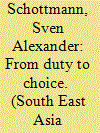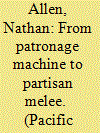| Srl | Item |
| 1 |
ID:
130575


|
|
|
|
|
| Publication |
2014.
|
| Summary/Abstract |
A content analysis of print advertisements and customer websites of Islamic banks in Malaysia, this paper examines the changing marketing and branding landscape of Islamic banking products and financial services. When Islamic banks were first set up in Malaysia in the early 1980s, their advertising material emphasized the religious obligations of Muslims to save and invest with shari'a-compliant financial products and services. Amid the ongoing liberalization of Malaysia's Islamic banking sector since the mid-1990s, a transformation of this marketing strategy appears to have taken place. Islamic banks no longer emphasize a priori the religious imperatives or even the ethical principles that underlie their business model. Rather, they tend to stress that banking according to the principles of the shari'a is an economically rational alternative to the conventional system. Islamic banks in Malaysia portray themselves not simply as Islamic banks, but as better, more profitable and safer alternatives to the crisis-prone conventional, interest-based banking sector. This paper examines this transformation, and seeks to relate the three broad trends it has identified in the advertisement of Islamic banking services to the wider socio-cultural, economic and political changes that have been under way in Malaysia since the late 1960s.
|
|
|
|
|
|
|
|
|
|
|
|
|
|
|
|
| 2 |
ID:
131063


|
|
|
|
|
| Publication |
2014.
|
| Summary/Abstract |
The party system in Indonesia has expanded in the post-Suharto era. With each successive election, voters have spread their support across a wider array of parties. This has occurred despite deliberate institutional tweaks designed to consolidate the system by privileging large parties. Why has the party system expanded despite increasing institutional incentives to consolidate? This article places party system change in a broader context of decentralization and corruption. The decentralization and deconcentration of political power has opened multiple avenues for voters and elites to access state resources. Whereas major parties were expected to dominate resources in the immediate aftermath of the transition, changes to the formal and informal institutions eroded their control over the state. This has caused previously consolidated subnational party systems to fracture. The argument is demonstrated using narrative and newly constructed cross-district datasets. The paper develops the concept of rent opportunities, defined as the ability to access and abuse state resources. Party system expansion has been greatest in areas with high rent opportunities, where both voters and elites are Social Media Presidential Election Indonesia 2014 Indonesiaparticularly motivated by the competition for state resources. In these areas, characterized by large state sectors, the formerly authoritarian party (Golkar) initially won large electoral victories due, in part, to its control over patronage. As Golkar lost its ability to monopolize resources, the party system fractured. Voting for small parties surged and the party machine was replaced by a partisan melee. My argument exposes the limits of institutional engineering and underlines the formative role corruption has had on the evolution of Indonesia's party system.
|
|
|
|
|
|
|
|
|
|
|
|
|
|
|
|